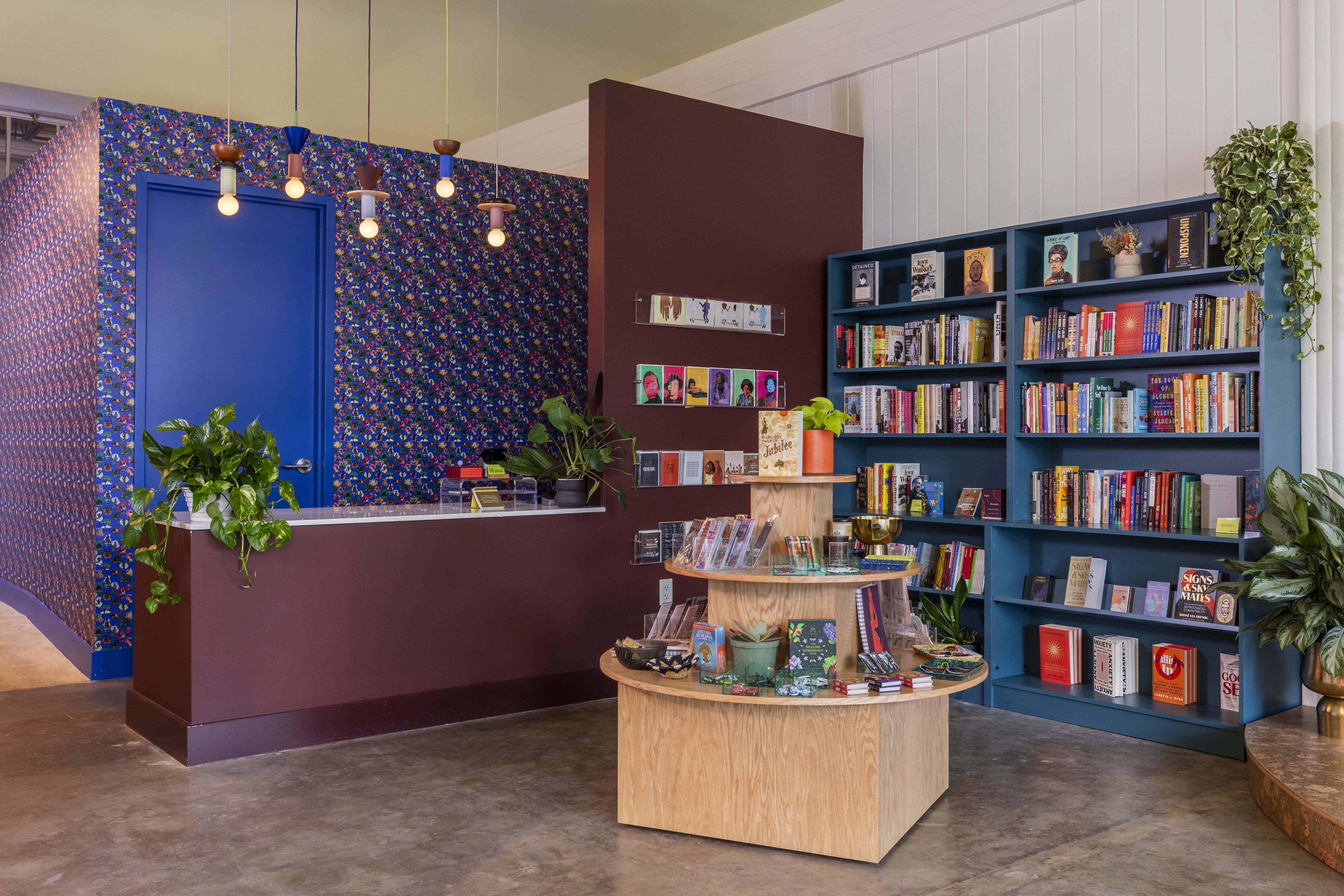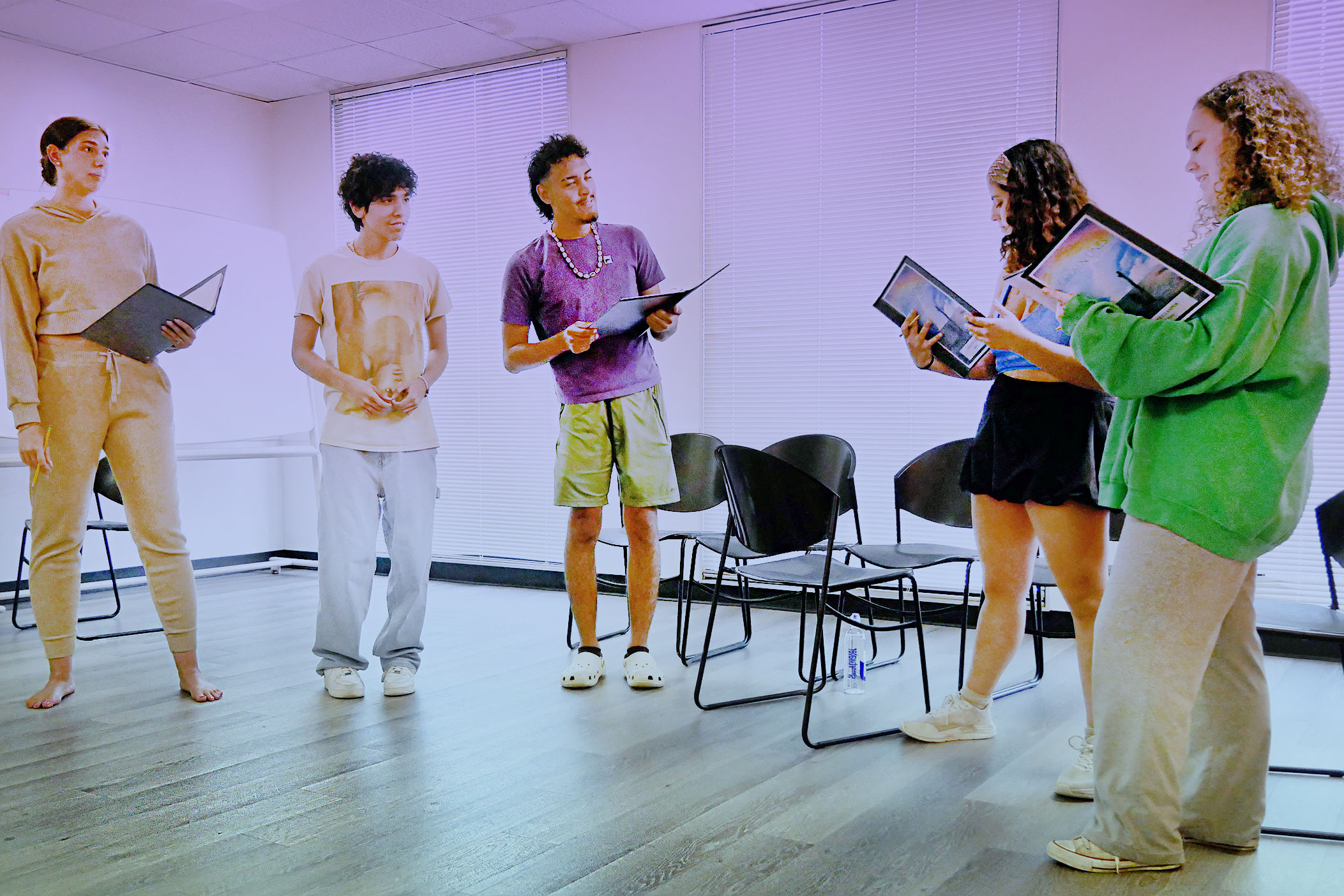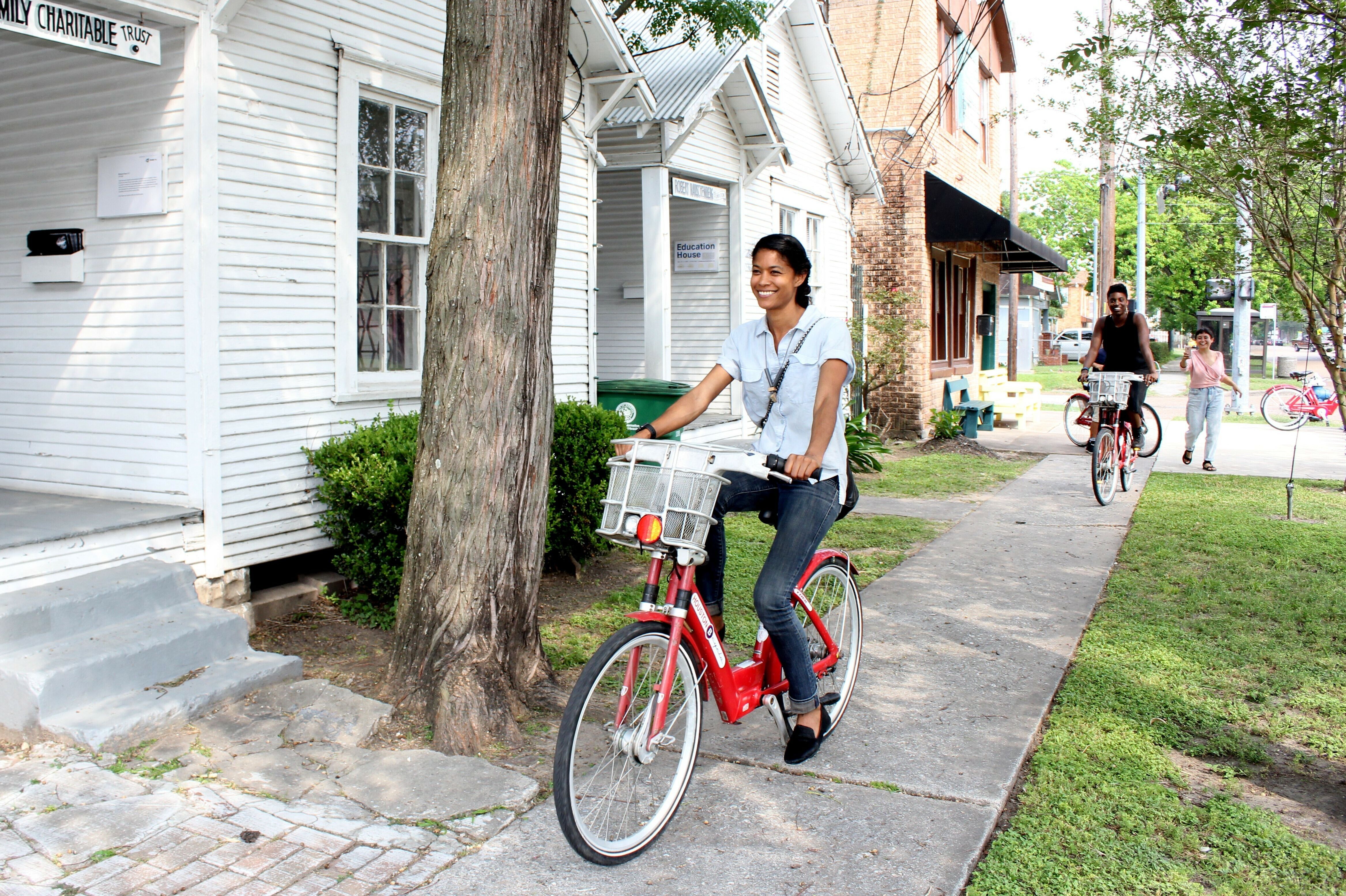Hillary and Chelsea Clinton Talk Gutsy Women, Expanding History, and Turning Texas Blue
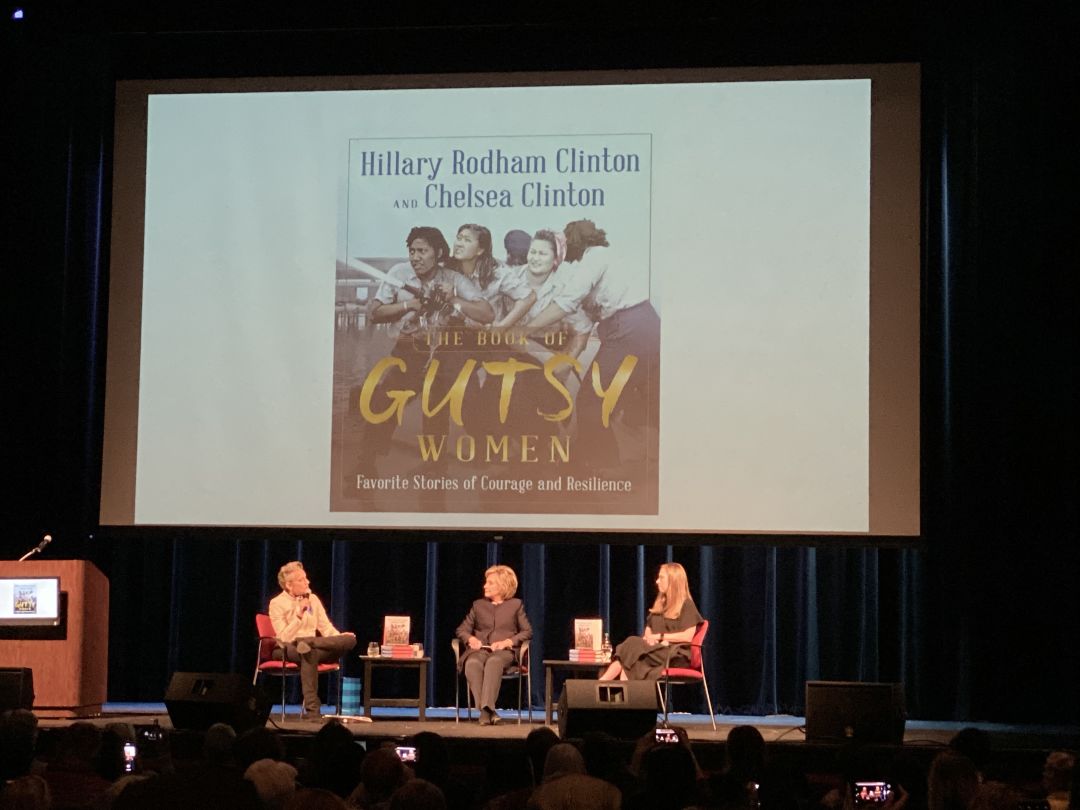
Barbara Radnofsky moderates a dialogue with Hillary and Chelsea Clinton at the University of Houston's Cullen Performance Hall last Friday.
Image: Jillian Goltzman
Hundreds of Houstonians braved the chill of an unusually blustery day on the University of Houston campus last Friday evening, when long lines and a heavy police presence suggested the prominence of the people inside Cullen Performance Hall: Hillary and Chelsea Clinton.
The two were in town on their nationwide tour promoting The Book of Gutsy Women, their first joint book project released October 1. Brazos Bookstore sponsored the ticketed event, which drew a predominantly female crowd—albeit a culturally and generationally diverse one.
More than a few sets of mothers and daughters posed for selfies inside the packed theater, where Kelly Clarkson’s “What Doesn’t Kill You Makes You Stronger” rang out over the speakers.
Lawyer, author, and politician Barbara Radnofsky—herself the first to win the Democratic nomination for a U.S. Senate seat in Texas back in 2006—moderated the program. During Radnofsky’s introduction, the crowd erupted in cheers at the title of her latest book: A Citizen’s Guide to Impeachment.
But they positively roared when it was Radnofsky’s turn to introduce the speakers. “Hillary. Rodham. Clinton,” she bellowed to raucous applause as the audience leapt to its feet. It was October 26, and Secretary Clinton had come directly to Houston from the Baltimore funeral of U.S. Rep. Elijah Cummings. It also happened to be her 72nd birthday.
The dialogue was part history lesson, part personal reflection based around the 103 essays that form The Book of Gutsy Women, in which mother and daughter ruminate on the influence of pioneering women, from activists to athletes, throughout the centuries and across the globe.
The book celebrates canonical figures like Harriet Tubman and Hellen Keller. But it also seeks to give lesser-known advocates, many forgotten from history books, their due.
Women like Elizabeth Peratrovich, an Alaskan Native who successfully led the fight for the first anti-discrimination law in the U.S., and women like Claudette Colvin, who was arrested in Montgomery, Alabama at age 15 for refusing to give up her bus seat to a white woman—nine months before Rosa Parks did the same.
“I do think history has to be expanded,” Hillary said. “People deserve to see themselves in history.”
The authors originally wrote over 200 essays before further winnowing the final list at their editor’s urging. “We could have had hundreds and hundreds and hundreds of women in this book,” Hillary said. “We could have written a whole book about the suffragists.”
That, they agreed, was particularly important as we approach the 100th anniversary of the ratification of the 19th Amendment in 2020. They sought to emphasize the oft-overlooked contributions of women of color to the suffrage movement, like journalist-turned-politician Ida B. Wells.
They also sought to dispel the notion that women’s suffrage was simply “women holding signs” or “women in big hoop skirts, maybe marching.” In reality, activists were jailed, maimed, and even tortured. “Women died. Women were severely injured,” Hillary said. “It’s almost hard to imagine how viciously opposed people were to the idea of women voting. And I would argue you can trace some of those same attitudes about keeping women in their place, keeping minorities in their place, all the way to the present day with the kind of voter suppression that we see.”
Radnofsky acknowledged Harris County Clerk Diane Trautman, who ousted GOP incumbent Stan Stanart last November. “As a result of her and many other efforts by gutsy women, you’re at ground zero for fighting vote suppression,” Radnofsky told the Clintons.
There were plenty more references to local figures, like Ann Richards. “Talk about inspirational, gutsy women,” Hillary said. “I write about Ann because Ann is just one-of-a-kind. There wasn’t anybody like her; there hasn’t been anybody like her since. She was always giving me advice … one time she said to me, ‘Hillary, pick a hairstyle and stick with it.’”
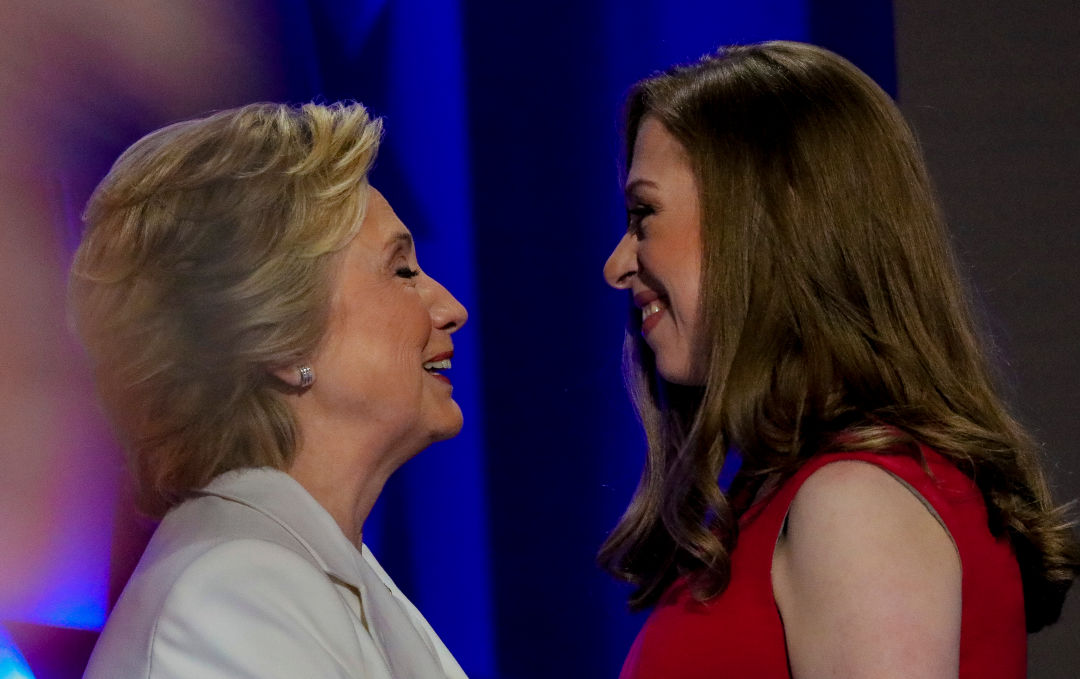
Hillary and Chelsea Clinton at the 2016 Democratic National Convention, when Hillary secured the presidential nomination.
They also lauded Barbara Jordan, who arrived in Congress the year President Richard Nixon would be impeached—and ended up on the Judiciary Committee, no less. “When she was growing up in Houston, she didn’t think, ‘I’m going to go to the Congress some day, then have to decide how to defend the Constitution and apply Articles of Impeachment to a president,’” Hillary said. She paused for a moment. “It’s kind of a relevant story, actually.”
She did address the current administration, though she never mentioned Trump by name. “I don’t think it would surprise anyone to hear me say I will do anything to make sure we have a different president. It is because I really revere the office of the presidency. I’ve agreed to disagree with presidents of my own party and the opposite party. I’ve been fortunate to know some,” she said to laughter. “It’s a really hard job. What’s happening now is so damaging to our country that it is hard to imagine what might happen if it’s not stopped.”
She shared similar sentiments here a few months ago when she spoke to the Harris County Democratic Party “to help you raise funds to keep electing really good people,” she said. “I want to see Texas turn blue.”
Gutsy Women pays homage across the aisle, however, with Margaret Chase Smith, the Republican senator from Maine who “stood up to her own party,” Chelsea said, as the first person to criticize Joseph McCarthy’s “tyrannical abuse of power.”
The authors raised Chase Smith as an example of doing the right thing, especially when it’s difficult. “We frequently wonder, where is the Margaret Chase Smith of today?” Chelsea said. Affirmative murmurs echoed through the theater.
“The reason that we have these women highlighted and that we’ve written about in the book is because we do want people to take heart,” Hillary said. “We want people to find not just inspiration and motivation but courage from reading about women who faced difficult challenges.”
To end the evening, Radnofsky read several audience-submitted questions, including one from 10-year-old Daphne who sat in the front row and wondered if women “will ever be seen as being 100 percent equal to men.”
The answer, Hillary replied, depends on us. “We have to believe that about ourselves, and we have to help our children believe it about themselves,” she said. “We have to continue to stand up against stereotypes and caricatures … that diminish the importance of a woman’s voice, the importance of a woman’s story.”
